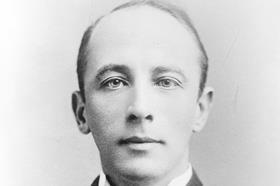December will mark 100 years since Carrie Morrison was admitted to the roll of solicitors in England and Wales; in May, we celebrated the centenary of Ivy Williams, the first woman called to the bar. Academic research is continuing to uncover the lives of the first women lawyers, and although it was men, and men alone, who were in control of the discriminatory method of admittance to the professions, it was also men who challenged and pushed the establishment to finally admit women. These men acted for women and challenged the status quo; their role requires recognition and should not be forgotten.

Bebb v The Law Society [1913]
We are all familiar with the Bebb trial, held in July 1913 in the High Court. Three notable men were present in that courtroom: Edward Bell, Stanley Buckmaster KC (pictured), and Mr Withers. Bell (later, president of the Law Society) was a witness, testifying that he would offer Gwyneth Bebb articles if successful. In 1912 he had proposed a motion to the Society that they should accept women, and failed. Against that professional background, Withers acted as Bebb’s solicitor, going against the tide of established thinking. Bebb’s KC was Buckmaster (MP, later lord chancellor and peer). Committed to opening the legal profession to women, he introduced two bills to parliament: the 1917 Solicitors’ (Qualification of Women) bill, and the 1919 Barristers’ and Solicitors’ (Qualification of Women) bill. Both were supported by the women’s movement.
Buckmaster was a non-traditional barrister. His father began his working life as an agricultural labourer and was a Corn Laws activist. His daughter, Margaret Dighton Pollock, was a social reformer and Labour party activist who started a contraceptive clinic in 1924, supported by Buckmaster, who tried to introduce a supportive bill.
Other ‘failed’ legislators: Lord Wolmer, Jack Hills MP, Benjamin Spoor MP, and Lord Cecil
Bebb’s litigation was part of a wider movement to open the legal profession to women. In 1912 Wolmer introduced a private member’s bill to admit women to the profession, the Legal Profession (Admission of Women) Bill 1912. It was supported by (among others) Hills and Cecil. Wolmer came from a political dynasty, his mother was Lady (Beatrix) Maud Gascoyne-Cecil, the founder of the Conservative and Unionist Women’s Franchise Association. His paternal aunt was Lady Laura Elizabeth Ridding, who established the National Union of Women Workers.
Hills supported Wolmer’s bill. Described as someone ‘whom British suffragists rank as one of their most faithful friends’, Hills was, by his marriage to Stella Duckworth, half-step-brother-in-law to Virginia Woolf and Vanessa Bell. Another supporter was Spoor. Like Buckmaster, Spoor’s father had come from humble beginnings. In March 1919, he introduced the Women’s Emancipation Bill on behalf of the Labour party. Finally, Cecil also supported Wolmer’s bill and represented Bebb in her Court of Appeal case.
Dinners to Celebrate the Sex Disqualification (Removal) Act
There were many dinners to celebrate women’s victory with the passing of the SDRA. The guest lists provide the names of many male invitees. For example, Holford Knight MP KC, who supplied Helena Normanton with a reference for her Middle Temple application. In 1913 and 1917 he proposed motions to the Bar Council to admit women, which were rejected.
Samuel Garrett was also a guest. He was brother to esteemed physician Elizabeth Garrett Anderson; Millicent Fawcett the suffragist; Agnes Garrett, activist for the opening of the professions to women; and cousin to Rhoda Garrett the interior designer. He was chair of the committee to open the legal profession to women.
Another guest was the extraordinary London magistrate Cecil Chapman. As an advocate for women’s suffrage, he had been chairman of the Men’s League for Women’s Suffrage, until his employers the Home Office forced him to stand down. A speaker at events organised by Emmeline Pankhurst, Chapman was adept at navigating his position and morals.
Conclusion
Women were barred from entering the legal profession by men, but it was supportive men, acting on behalf of women, that finally opened up the profession. The recognition of supportive men does not deny the agency of women. It does not mean that women did not struggle, make sacrifices, face numerous disappointments and suffer economically. Nor does it mean that women did not organise themselves into powerful pressure groups, and exert a legally limited autonomy to demand an end to discrimination. It simply means that women needed men to open the door of a closed profession on their behalf, because men controlled the established institutions that women aspired to join. To ignore this is to relate a simplistic and incomplete history.
The danger is that if we speak of men’s role in this history we deny the agency of women, and continue to mute women’s voices (as history has done until recently). We may also perpetuate the pre-1919 myth that women are no better than infants and dependent on men.
But look at the great things that can happen if we all work together – we can change law and society.
Dr Judith Bourne is a programme director for law and an associate professor at St Mary’s University, Twickenham































No comments yet